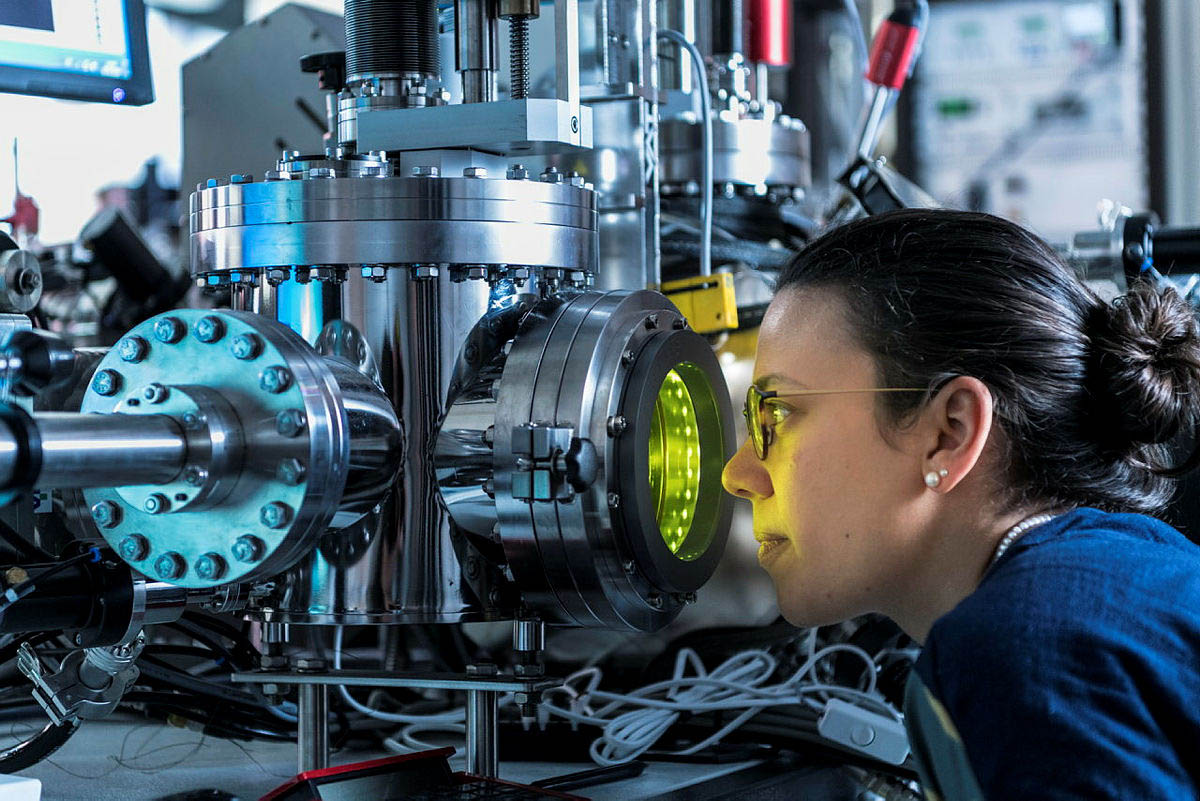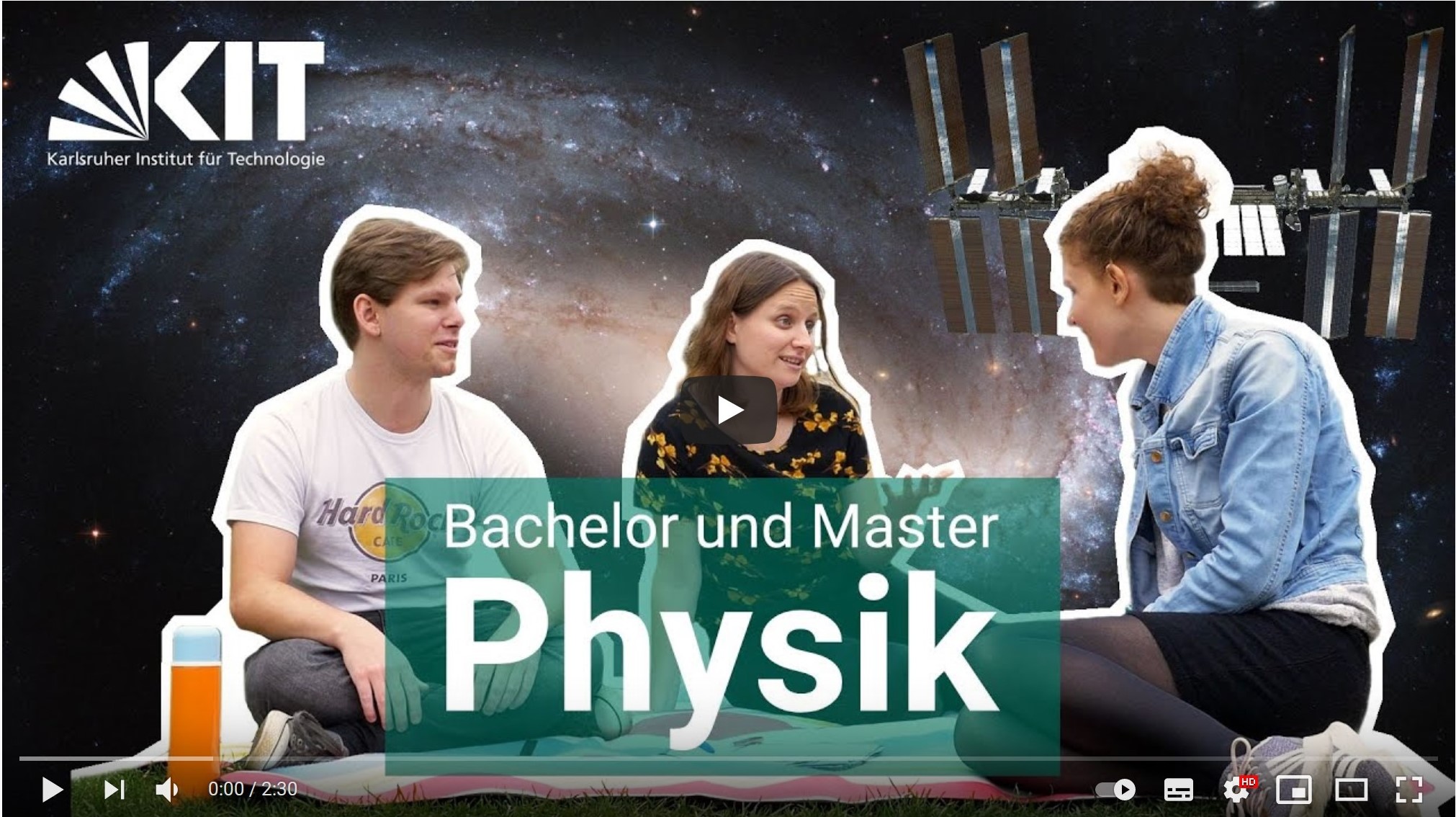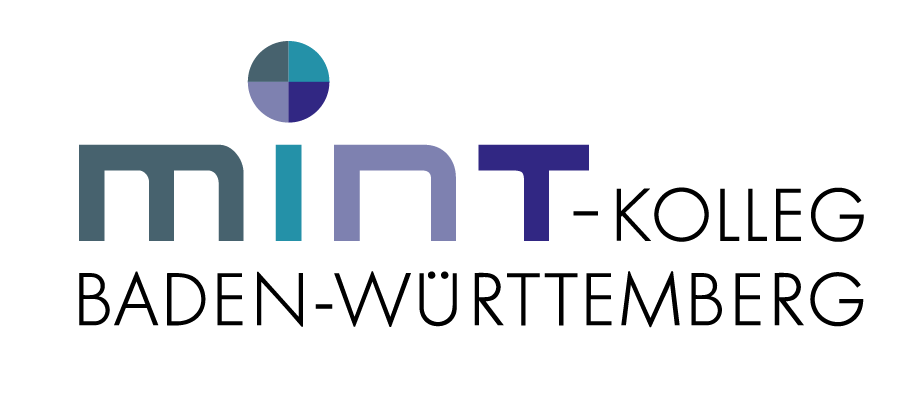Degree: Bachelor of Science (B.Sc.)
Regular program length: 6 semester (full-time program)
Credit points (ECTS): 180 credit points
Language of instruction: German
Higher semester: no
Higher semester: winter and summer term
First semester: September 15
Higher semester: September 15 for winter term, March 15 for summer term
First semester: July 15
Higher semester: July 15 for winter term, January 15 for summer term
Studiengangsbeschreibung
Worum geht’s?
Im Bachelorstudiengang Physik erhältst du eine breite, solide Grundlagenausbildung in allen zentralen Bereichen der experimentellen und theoretischen Physik. Du lernst, physikalische Fragestellungen systematisch zu analysieren, Modelle zu entwickeln und diese mithilfe von Mathematik, Experimenten und modernen computergestützten Methoden zu bearbeiten.
Neben dem Fachwissen erwirbst du sowohl forschungs- und wissenschaftsorientierte Methodenkompetenz als auch berufsfeldbezogene Fertigkeiten. Pflichtbestandteile wie physikalische Praktika, Programmierkurse, Veranstaltungen zur Rechnernutzung in der Physik und erweiterte Wahlmöglichkeiten im Bereich Mathematik tragen gezielt dazu bei.
Der Studiengang bietet dir zudem viele Freiräume zur individuellen Profilbildung, insbesondere durch das Angebot eines breiten Spektrums an nichtphysikalischen Wahlpflichtfächern (von C wie Chemie bis W wie Wirtschaftswissenschaften) sowie durch Wahlmöglichkeiten bei den fortgeschrittenen Physikmodulen. Er legt damit ein stabiles Fundament für den Übergang in ein spezialisiertes Masterstudium.
Program structure
During your studies, you have various subjects, which consist of one or more modules. A module deals with a specific topic and consists of one or more courses. In the module handbook for your degree program, you will find a description of the modules and their subject assignment as well as a study plan. This gives you an orientation as to which courses you should attend in which semester in order to complete your studies within the standard period of study. It takes into account a balanced distribution of courses over the individual semesters. It also ensures that you are first taught the important basics before moving on to more advanced topics. Your individual course of study may differ from this.
Das Bachelorstudium der Physik am KIT gliedert sich in die Fächer Experimentalphysik, Theoretische Physik, Mathematik, Programmieren und Rechnernutzung, Physikalische Praktika, Wahlpflichtfach und Bachelorarbeit sowie Überfachliche Qualifikationen (ÜQ). Das Studium verläuft in drei aufeinander aufbauenden Phasen:
Phase I (Semester 1–3):
In dieser Phase legst du das Fundament für dein Verständnis der klassischen Physik und Mathematik. Du belegst die Module:
- Klassische Experimentelle Physik 1-3: Mechanik, Elektrodynamik, Optik & Thermodynamik
- Klassische Theoretische Physik 1-3: Einführung, Mechanik, Elektrodynamik
- Höhere Mathematik 1-3
- Programmieren und Computeralgebra: Programmieren und Algorithmen (Python), Computeralgebra
- Computergestützte Datenauswertung (als Pflichtmodul im Fach ÜQ)
- Praktikum Klassische Physik 1
- Nichtphysikalisches Wahlpflichtfach: zu wählen ist hier ein Grundlagenmodul aus den Fächern Anorganische und Organische Chemie, Physikalische Chemie, Elektrotechnik, Informatik, Philosophie, Werkstoffkunde, Wirtschaftswissenschaften, Geophysik oder Meteorologie
Phase II (Semester 4–5):
Hier stehen die moderne experimentelle und moderne theoretische Physik im Mittelpunkt. Im Einzelnen belegst du die Module:
- Moderne Experimentelle Physik 1-2: Kerne, Atome und Moleküle; Struktur der Materie
- Moderne Theoretische Physik 1-2: Quantenmechanik; Fortgeschrittene Quantenmechanik und Statistische Physik
- Wahlveranstaltung Rechnernutzung: Statistische Datenanalyse oder Einführung in C++
- Praktikum Klassische Physik 2
- Praktikum Moderne Physik
- Nichtphysikalisches Wahlpflichtfach
Phase III (Semester 6):
Im letzten Semester deines Bachelorstudiums wählst du je ein weiteres vertiefendes Modul in moderner experimenteller und moderner theoretischer Physik:
- Moderne Experimentelle Physik 3: Experimentelle Festkörperphysik oder Astro- und Teilchenphysik
- Moderne Theoretische Physik 3: Theorie der kondensierten Materie oder Theoretische Teilchenphysik
Du erwirbst weitere Überfachliche Qualifikationen, z.B. durch das Modul „Einführung in das Rechnergestützte Arbeiten” oder Veranstaltungen, die du beim House of Competence (HoC) oder dem Sprachenzentrum belegst.
Und schließlich widmest du dich deiner Bachelorarbeit. Mehr dazu findest du weiter unten.
Berufspraktikum
Ein Pflichtpraktikum ist im Bachelorstudiengang Physik am KIT nicht vorgesehen. Ein Berufspraktikum wird vorzugsweise für das Masterstudium empfohlen.
Auslandsaufenthalte
Im Bachelorstudiengang Physik hast du die Möglichkeit, wertvolle internationale Erfahrungen zu sammeln. Du kannst zum Beispiel ein Auslandssemester absolvieren, in dem du ohne Studiengebühren an einer Partnerhochschule studierst und Leistungen erbringst, die dir bei deiner Rückkehr ans KIT anerkannt werden können. Am besten eignet sich hierfür das dritte oder vierte Bachelorsemester.
Weitere Informationen zu bestehenden Austauschprogrammen, wie zum Beispiel ERASMUS+ oder dem Eucor-Verbund erhältst du auf der Seite Austauschprogramme der KIT-Fakultät für Physik sowie beim International Students Office des KIT, das zusätzlich noch weitere Programme für alle KIT-Studierenden anbietet.
Im Masterstudium hast du die Möglichkeit einen deutsch-französischen Doppelabschluss in Kooperation mit der Université Grenoble Alpes oder dem Grenoble INP zu.
Bachelorarbeit
Zum Abschluss deines Studiums fertigst du eine Bachelorarbeit an, mit der du zeigst, dass du eine physikalische Problemstellung selbstständig und in begrenzter Zeit nach wissenschaftlichen Methoden bearbeiten kannst. Der Umfang der Bachelorarbeit entspricht 12 LP. Die maximale Bearbeitungsdauer beträgt sechs Monate.
In welcher Sprache die Bachelorarbeit verfasst werden kann, legt der Prüfungsausschuss fest. Auf Antrag kann auch eine andere Sprache als Deutsch genehmigt werden.
Qualification profile of the graduate
Graduates of the Bachelor's degree in physics know the fundamental aspects of experimental and theoretical physics. They also know how to use the relevant mathematical tools. Furthermore, they have fundamental knowledge in programming and the use of computers, and in a side subject not related to physics which can be chosen by the student. Graduates have the skill to apply theoretical concepts to the description of concrete problems in physics and to solve them. Moreover, they can apply basic measurement techniques using the relevant statistical methods. Based on empirical methods, they have the ability to establish connections, formulate models, make predictions, and verify or falsify them. Graduates can apply their knowledge of theoretical and experimental physics to research-related problems. They are able to investigate technical problems and solve them using the methods they learned during their studies, using both on software and hardware. Graduates have the expertise to summarize their scientific results in written and oral form and they can present them using engaging presentation skills. The successful completion of the degree course enables graduates to work in various areas, such as research and development at universities or in industry, data analysis and optimization of processes, and programming and hardware applications. At KIT there is special emphasis on research-related teaching. For this reason all basic knowledge is conveyed during the Bachelor's degree studies. As a consequence during the Master's degree studies it is possible to specialize to sub-topics of physics.
Berufsperspektiven
Berufsperspektiven eröffnen sich nach Abschluss des sich anschließenden Masterstudiums in der universitären wie industriellen Forschung und Entwicklung, in der Datenanalyse und Prozessoptimierung sowie in der Programm- und Hardware-Entwicklung, Unternehmensberatung, Versicherungswirtschaft oder im Patentwesen.
Besonderheiten des Studiengangs
Besonderheiten von Physik B.Sc. am KIT
-
breites Angebot an Wahlfächern aus dem Bereich der Natur- und Ingenieurwissenschaften, Informatik oder Wirtschaftswissenschaften zu Beginn des Studiums
-
Wahlmöglichkeit Mathematik (angewandt oder mit den Mathematikern)
-
Brückenkurse und semesterbegleitende Kurse am MINT-Kolleg
-
große Wahlmöglichkeit, individuelle Profilbildung und ein breites Angebot im Master
-
Möglichkeit eines deutsch-französischen Doppelmasters
What KIT has to offer
- central campus close to the city forest and right next to the city center
- orientation week before the start of lectures
- 24-hour library offering single and group working places
- wide range of inexpensive catering options (dining hall, cafeteria, Koeri and Pizzawerk)
- numerous interdisciplinary offers for personal and professional development, e.g. Lernlabor, Schreiblabor and Perspektivenlabor
- study abroad, e.g. via Erasmus
- excellent university sports facilities with a large selection of sports
- comprehensive cultural offerings with university orchestras, choirs and theater groups
- extensive support for career entry and self-employment
- Lernraum app
- internationally oriented degree programs and diverse exchange programs
- modern laboratories and practical teaching methods
- diverse student initiatives, clubs and opportunities to actively participate in campus life
- stay in touch after graduation via the alumni network
Zugangsvoraussetzungen und Sprachnachweise
Higher education entrance qualification (HZB)
Germans and persons of equal status to Germans (i.e. EU/EEA nationals and non-EU/EEA nationals with a German higher education entrance qualification) are entitled to study at KIT if they have one of the following qualifications:
- General higher education entrance qualification (Abitur)
- (relevant) subject-restricted higher education entrance qualification (not Fachhochschulreife)
- Delta examination of the University of Mannheim (for holders of a Fachhochschulreife)
- recognized advanced vocational training (e.g. master craftsperson) or vocational training, professional experience and aptitude test for those with professional qualifications
For further options, see §58 of the "Landeshochschulgesetz" (State Higher Education Act).
Please note: German nationals with a foreign school-leaving qualification must have the relevant "Regierungspräsidium" (regional authority) certify that their qualification is equivalent to the German Abitur.
For non-EU/EEA nationals with a foreign school-leaving certificate (hereinafter also referred to simply as non-EU/EEA nationals), the school-leaving certificate from some countries is recognized as a direct university entrance qualification in Germany. In many cases, however, in addition to the school-leaving certificate, a university entrance examination and/or a successful year of study in the home country and/or the "Feststellungsprüfung" must be proven with valid documents in order to be allowed to study a bachelor's degree in Germany. You can find the country-specific regulations in the DAAD admissions database or on the Anabin website (in German only) of the "Zentralstelle für ausländisches Bildungswesen" (Central Office for Foreign Education). Further information is available from the International Students Office.
Sprachvoraussetzungen und -nachweise
Für den Bachelorstudiengang Physik benötigst du ausreichende Kenntnisse der deutschen Sprache, welche mindestens dem Niveau C1 des Gemeinsamen Europäischen Referenzrahmens für Sprachen (GER) entsprechen müssen.
Proof of sufficient German language skills
Your higher education entrance qualification (HZB) is sufficient proof of your German language skills,
-
if you obtained it at a German-speaking school in Germany or abroad,
-
if you are a graduate of a bilingual secondary school in Germany or abroad and have passed a bilingual German examination, such as the AbiBac or the Gemischtsprachiges International Baccalaureat (GIB) or
-
if you graduated from a foreign school, but there is another official agreement with the respective country on the recognition of your school-leaving certificate or language certificate as proof of language proficiency for university studies in Germany.
A complete list of foreign school-leaving qualifications and language certificates that are recognized as proof of sufficient German language skills can be found on the website of the Kultusministerkonferenz (Standing Conference of the Ministers of Education and Cultural Affairs of the Länder in the Federal Republic of Germany).
If you did not obtain your higher education entrance qualification at a German-speaking institution, you must provide a separate language certificate - regardless of your nationality. Only the following are accepted
- the passed „Prüfungsteil Deutsch“ of the Feststellungsprüfung,
- the passed DSH with the overall result DSH-2,
- the passed TestDaF level 4 in all four parts of the exam (reading comprehension, listening comprehension, written expression, oral expression) or
- a comparable, recognized certificate of sufficient German language skills.
To find out which other recognized certificates can be accepted as comparable by KIT, please contact
- as a German or German-equivalent applicant: Studierendenservice
- as an applicant with non-EU citizenship: International Students Office
Please note:
Language certificates are extremely important application documents that can prevent your enrollment if you do not submit them on time. Therefore, check early on in the application process whether you have the necessary language certificates for your degree program and, if necessary, plan to take one of the language tests mentioned above. The deadline by which you must submit language certificates corresponds to the enrollment deadline stated in your admission offer. In justified cases, you can apply for an extension of this deadline. The extension can be granted until the start of the lecture period at the latest.
Additional necessary requirements for enrollment
For Germans and those with German equivalent status, an additional necessary requirement for enrollment is proof of participation in a study orientation test (e.g. www.was-studiere-ich.de) or a study orientation consultation in accordance with §7 of the "Landeshochschulgesetz" (State Higher Education Act), e.g. by the Student Advisory Service (ZSB) of KIT. Non-EU/EEA nationals do not have to provide this proof.
Application portal
Application for the 1st semester
Application for a higher semester
Study preparation
Prepatory courses at KIT: The MINT-Kolleg offers prospective and first-year students support in natural science and technical subjects (STEM).
In addition, the KIT-Departments offer special preliminary courses before the start of the semester program during the "O-Phase" (orientation week).
Support during your start at KIT
The KIT offers support for all first-year students in order to have a successful start of their studies. Numerous orientation events and mentoring programs at the KIT-Departments help students to make friends, orientate themselves and find support where needed. The central online portalstudienstart.kit.edu is a first guide to all important offers, brings together all relevant information and contains helpful hints for a successful start of your studies:
- advisory centers
- mentoring programs
- info sessions
- workshops
- extensive online information
Contacts
Student advisor
Student advisory services (ZSB)


Karlsruher Institut für Technologie (KIT)
Zentrale Studienberatung (ZSB)
Engelbert-Arnold-Str. 2
76131 Karlsruhe
Karlsruher Institut für Technologie (KIT)
Studierendenservice
Kaiserstr. 12
76131 Karlsruhe
First point of contact for international applicants
Karlsruher Institut für Technologie (KIT)
International Students Office (IStO)
Adenauerring 2
76131 Karlsruhe
Printed matter
Module handbook
| Titel | Download |
|---|---|
| Module handbook Physics Bachelor | PDF (German) |
| Public view Physics Bachelor in the Campus Management System | Link (German) Link (English) |
Statutes and regulations
| Titel | Stand | Download |
|---|---|---|
| 2014 KIT 019 Satzung zur Umsetzung des Übereinkommens über die Anerkennung von Qualifikationen im Hochschulbereich der Europäischen Region vom 11. April 1997 gemäß §§ 32 Abs. 2, 4 und 36a LHG in den Studien- und Prüfungsordnungen am KIT | 28.03.2014, veröffentlicht 28.03.2014 | |
| 2013 KIT 028 Satzung des Karlsruher Instituts für Technologie (KIT) über die Änderung der Prüfungsordnungen für die am MINT-Kolleg Baden-Württemberg beteiligten Bachelorstudiengänge | 12.08.2013, veröffentlicht 20.08.2013 | |
| 2010 KIT 038 Studien- und Prüfungsordnung des Karlsruher Instituts für Technologie (KIT) für den Bachelorstudiengang Physik | 20.07.2010, veröffentlicht 21.07.2010 | |
| 80. Studien- und Prüfungsordnung der Universität Karlsruhe (TH) für den Bachelorstudiengang Physik | 10.09.2008 |
Teaching calendar
WT 2024/25
10-21-2024 to 02-15-2025
ST 2025
04-22-2025 to 08-02-2025
WT 2025/26
10-27-2025 to 02-21-2026
ST 2026
04-20-2026 to 08-01-2026
WT 2026/27
10-26-2026 to 02-20-2027
ST 2027
04-19-2027 to 07-31-2027
WT 2027/28
10-25-2027 to 02-19-2028
ST 2028
04-18-2028 to 07-29-2028
Lectures will not take place:
- From 12-24 to 01-06
- the week after Pentecost
- on all public holidays in the state of Baden-Wuerttemberg







